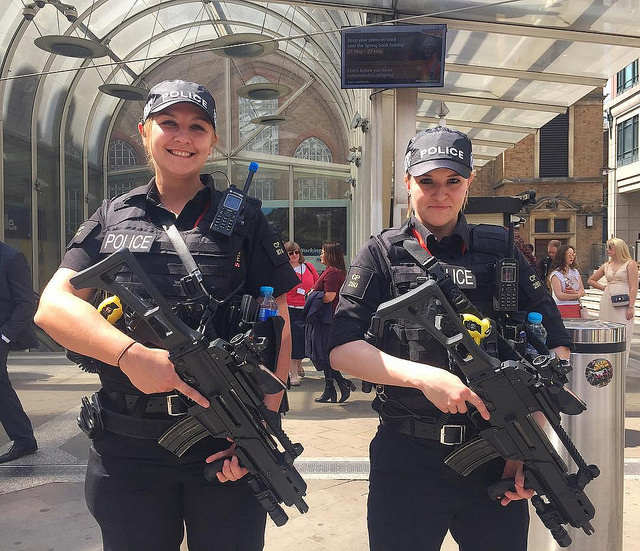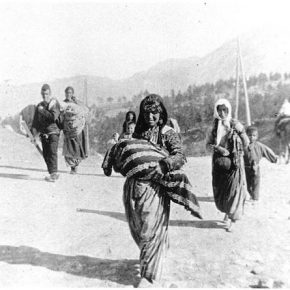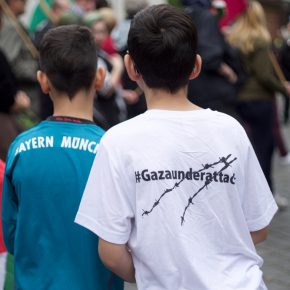Walking home the night of the attacks at London Bridge and Borough Market, I came to a pedestrian crossing where a man shouted from his car “Fuck terrorists!” as he passed by. A small befuddled crowd nearby muttered to each other: “Did he just say ‘fuck tourists’?”
Somehow the flippancy of responses to the killings provide comfort for a lot of people. Stories of people lobbing pints at the assailants, the guy who went back to pay his bill and tip the staff, the football fan who yelled “Fuck off, I’m Millwall!” before taking on the trio. These tales run alongside the rhetoric of “enough is enough” and the UK “coming together” in the face of terror.
Instead of soul-searching, we find plenty of uncritical boasting on social media. The shot of a man running from the scene with a pint in his hand seems to confirm London’s self-image. We’re meant to be defiant in the face of such grotesque violence. We’re invited to take comfort in these displays of English stoicism and pride in self-defence.
It’s as if we’re trying to ward off something we’d rather not face. Sure the day after the attack was like any other Sunday, except with security warnings on the tube and armed police buying meal deals in your local Sainsbury’s. No matter what plucky London soldiers on, we tell ourselves. “No terror please, we’re English!”
Amidst all this people have been talking up the spirit of the Blitz. It’s how I remember the aftermath of 7/7. A lot of softcore patriotism about the stiff upper-lip, the phlegmatic commitment to everyday routine and the general anonymity of London crowds. “Keep calm and carry on,” as the cliché goes. But the truth of the Blitz is far less rosy than people like to think.
Most people stood together during the Blitz because they were trapped in a tube station by bombs. After all there was nowhere else to run for the majority of people. The rich either moved into well-fortified hotels or fled the capital to wait out the bombing. Meanwhile looting was rife after the raids, even the fire brigade couldn’t resist the easy pickings.

This was after the Conservative strategy of appeasing Hitler had failed. The heroic stand of Churchill against Nazi Germany came after years of compromise. The Tory government had sold Czechoslovakia down the river, but it was never going to be enough to barter with fascism. So it was necessary to turn the sordid story of the 1930s on its head by focusing the national narrative on 1940.
From this it should be clear why the Second World War analogy is not appropriate for today. Not only was the threat of National Socialism far greater than that of Islamism. The problem of lone wolf attacks and spree killing is a uniquely modern phenomenon. The attacks on Manchester Arena and London Bridge are akin to the Columbine shooting and the Oklahoma City bombing.
Yet the consensus remains one of national security, e.g. what measures should be used to crack down on potential extremists. May has been talking tough, but not tough enough for some. Nigel Farage and Paul Nuttall have been calling for a return to interment, the very same policy that was such a great recruiting drive for the IRA during the Troubles.
The far-right have rolled out the usual tropes: terrorism is the result of multicultural society. If it weren’t for uncontrolled mass immigration they argue, the UK wouldn’t be facing the threat of radical Islamism. Though the UK has only had freedom of movement with Ireland and continental Europe and Muslim immigration has always been controlled. But the point isn’t to offer facts or even a solution.
At the same time Jeremy Corbyn has exploited May’s weaknesses on cutting the police budget. Austerity has reduced police numbers by 20,000 and Corbyn has drawn links between the drop in Bobbies on the beat and the violence we’ve seen on the streets. It’s an unusual line for a left-wing politician to take, but it’s effective for precisely that reason.
It’s hard for Theresa May to deflect such criticism. At the Home Office, May was culpable for streamlining the police force just as she was responsible for instituting a hard line on deportations. Common sense would have it that you need more cops if you want a fast security response to threats of violence. This is why Corbyn’s words strike a chord with the public.
Although the Labour campaign has done well to exploit this weak spot, the fact that police numbers has little to do with enforcement or response time is lost in the debate. Even in terms of burglary rates, the number of cops makes little impact on the level of crime. The same goes for terrorism because the police are usually there to act once a crime has taken place. Preventative measures are another matter.
Of course, if you get rid of private property and move beyond capitalism, it might be possible to do away with the police force as the institution exists today. An egalitarian world with greater decriminalisation and less alienation would be fit for locally organised community patrols, which could be based on greater accountability. This would presuppose much more justice to right past wrongs.
The strong points of Corbyn’s position is that it combines the common sense of higher police numbers with the radicalism of setting new limits on British foreign policy. Some on the left would want to see more radical stuff like abolishing prisons and moving away from the police as traditionally constituted. But these matters are more long-term considerations. Once again, we find Corbyn is more flexible than his detractors claim.
It’s unclear whether the rhetoric of “enough is enough” will be enough to save May’s agenda. Corbyn’s poll rating has improved hugely since the campaign began. Now Labour ranges between 33% and 40% in the polls and the Tories are wavering from 47% to 40%. It’s possible that the Conservative leader will be ousted even if she secures a decent majority. The once stable politics of Britain have become more volatile than ever.
Photograph courtesy of Dave Ryan and David Holt. Published under a Creative Commons license.





